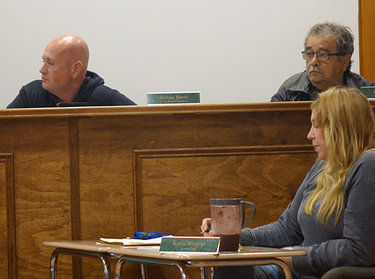Westerlo board divided over salary hikes proposed in $3.6M spending plan
WESTERLO — What was meant to be an hour-long runthrough of the Westerlo tentative budget was stretched out Wednesday night by a focused — and later heated — discussion over appropriate raises for the town clerk and her deputies.
The amended 2022 budget holds $130,500 in the personal-services category under the town-clerk section, and that amount was raised to $145,000 — a roughly 11 percent increase that follows what in 2022 was a 25 percent increase, from $104,380.
“That’s a lot to justify,” said town Councilwoman Amie Burnside, calling it a “huge” increase over two budget cycles.
The town-clerk post is full-time in Westerlo, which also employs three deputy clerks.
Supervisor Matthew Kryzak had earlier noted that the various cost increases for personal services throughout the budget were estimates made under the consideration that the inflation rate would be hard to predict very far in advance, and also that wages and salaries wouldn’t be finalized until the town’s reorganizational meeting in early January.
“This document and budget isn’t necessarily addressing anybody’s raises,” Kryzak said. “It’s addressing what the estimated cost will be for that specific role. Without that information, I know it’s hard to digest why the numbers are going up, but … across the board, with the economic times and inflation at 9 percent or something like that, I think most employers are doing somewhere between 3- to 5-percent raises.”
The inflation rate officially clocked in at 8.2 percent last month.
Kryzak said, “Usually when it goes up it doesn’t go down, but sometimes it does, so we don’t want to give up too much, but we also don’t want to give out too little. We’re trying to ride out the storm a little bit to figure out where we need to be in the new year to make sure that employee dollars are still worth the same amount in 2023.”
Under the tentative budget, the town clerk receives $3,000 more for a total of $63,000, a 5-percent increase; deputy clerk I receives $3,000 less for a total of $20,500, a nearly 13-percent decrease; deputy clerk II receives $5,500 more for a total of $43,500, a roughly 14-percent increase; and deputy clerk III receives $9,000 more for a total of $18,000, a 100-percent increase.
More work
Clerk Karla Weaver, who said she frequently works more than 40 hours a week, explained that the decrease for the first deputy clerk reflects a rearrangement of hours, while Kryzak said that the increases reflect the amount of work that the clerk’s office handles, and the hours that work requires.
For instance, he said, “We don’t have a recreation department. A lot of the towns that do the functions we’re doing have a recreation department, so there’s some expenses that go into that … You can justify some increase in hours for people in that office to help with the recreation department because, if I don’t get those folks to do that work, we’re going to have to hire somebody.”
Kryzak said the clerk’s office has also taken on the work of creating a newsletter, and next year will start handling the water bills, of which his office is currently in charge. The supervisor’s office expenses are dropping about $15,000 under the current budget.
“This year alone we’re going to add a couple items to that office,” he said, “so that’s why I’m not so worried about what that number ends up being.”
He then stressed that those with concerns should consider the budget overall and think about increases along with decreases to come to a more precise understanding of what costs are being added, as opposed to merely reallocated.
Objections
Councilman Joshua Beers, who was critical of the increases, stood firm, however, invoking the salary paid to the town clerk in Coeymans, which has a population of around 7,200 compared to Westerlo’s approximately 3,300.
“I’m here for the taxpayer,” he said. “When I see numbers that don’t make sense, I can’t say yes to it, because … when somebody asks me, ‘Josh, why are we paying this much when this town that borders us has three times our population, three times our tax base, they got a power plant, they got a cement plant’ … I have to have an answer for that. I can’t just look up at the sky and say, ‘I don’t know.’”
Coeyman’s 2023 tentative budget shows the town clerk’s office getting $97,224, up $2,714 from this year; that includes $88,557 for personal service, $1,440 for equipment, and $4,513 that is contractual. The town clerk there would receive $52,000 of that money, up from $50,500.
Of the work the Westerlo clerk’s office does with recreation and the newsletter, Beers said, with agreement from Mahan, “Those are things you do out of the goodness of your heart; they’re not things that you have to do.”
“Those are things that we should do,” Kryzak replied. “... If we’re not doing or providing things for the community besides a transfer station permit and plowing the road — you have to have some semblance of community. Most towns that are successful and not suffering from rural decay try to invest in activities in their town to try to keep young people in their town.”
When Beers said that people should donate their time for those things, Kryzak said that the town has enough trouble finding people for paid positions.
Lawyer’s pay
Latent frustrations among the board members in that conversation spilled over into a later discussion about how much the town will pay to contract the services of its attorney, George McHugh. He is budgeted $24,000 in the amended 2022 budget and would receive $28,000 under the tentative 2023 budget, which Kryzak said was due to additional responsibilities he was taking on, such as training for the planning and zoning boards, among other things.
Beers and Mahan felt that a lesser increase would suffice, while Kryzak maintained that fair payouts were important to retaining “a good professional service.”
Kryzak asked for a show of hands from the board to gauge the interest between the $28,000 value and $26,400 proposed by Beers, with three out of five members favoring the latter.
“You’re not looking at the budget. You’re going to sit here and waste my time in a negotiation over $1,600 to contract a professional service,” said Kryzak, who had been hoping to get through the entire budget in one hour before moving on to the rest of the agenda items but, largely due to the salary discussions, ultimately took two hours.
The board decided to table the discussion and move forward amid the rising tensions.
Big picture
Although Kryzak ran through the entire budget for the public, virtually line-by-line as his predecessor Bill Bichteman had done before him, he acknowledged that some changes from the version shown were already made on another copy that had yet to be publicized, meaning the overall picture was somewhat crude. The town has until late November to adopt a final budget.
Kryzak said that the overall budget was $3,608,896 — around $150,000 lower than the 2022 budget — with a slight tax increase. The presented budget had the tax increase at 2 percent, but Kryzak said it will be less than that in the next version.
Although hard copies of the dated budget that Kryzak presented on the screen were not distributed at the meeting, it’s available online, with the newer version to be posted before the next meeting on Oct. 18.


